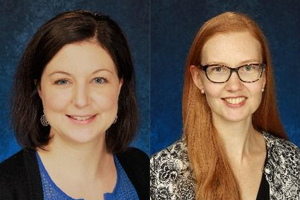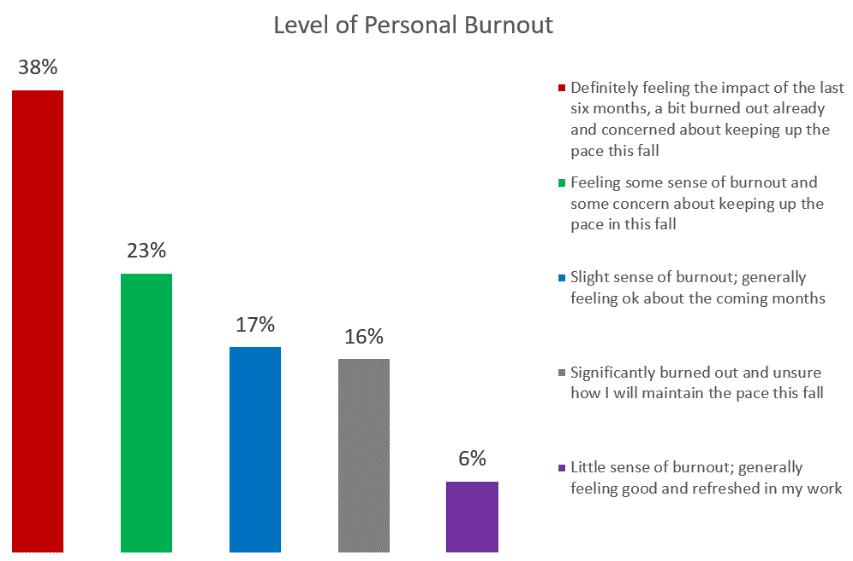Commentary
September is keeping me hopping. We have several research projects in the works, and we have the pleasure of awarding research grants this month and welcoming a new member to the research advisory board.
Welcoming A New Research Advisory Board Members
The current research advisory board (RAB) members and the AACRAO management team conferred on the applications for the two soon-to-be-vacant positions on the RAB. As mentioned in a previous blog post, Sam Fugazzotto and Christopher Tremblay will be stepping
down from their roles on the RAB effective at the end of September after many years of service to AACRAO.
I’d like to welcome our newest members, Joseph Paris, Assistant Professor at Temple University and Kizzy Morris, University Provost & Chief Academic Officer, Cheney University of Pennsylvania.

Joseph Paris & Kizzy Morris |
Dr. Paris is an Assistant Professor of Higher Education at Temple University. His research and teaching focus on the intersection of institutional effectiveness and college student success and draw upon his professional experience in enrollment management
and higher education marketing. His work analyzes the relationships between college admissions criteria and selection methodologies, institutional finance, college student success, and access to postsecondary education. His past research investigated
the validity of a measure of motivational-developmental dimensions in predicting academic performance and student persistence and how these variables can be effectively applied in college admissions. He holds a Doctor of Education in Higher Education
Leadership from Temple University and a Master of Business Administration and Bachelor of Science in Marketing from Fairleigh Dickinson University.
Kizzy Morris, Provost and Chief Academic Officer at Cheyney University has over 22 years of progressive higher education experience in academic administration, admissions, financial aid, student billing, registrar, placement testing, institutional research, and IT systems coordination. Kizzy’s student-centered philosophy is the driver for her work with different institutions on enrollment services, student success pathways and employee professional development.
Throughout her career, Kizzy has been a member and officer of several professional organizations, often presenting at conferences throughout the US on topics such as student services, enrollment management, financial aid, student information systems and staff career development. Kizzy holds a Master's degree in Project Management from Keller Graduate School of Management and a Bachelor of Science in Business Information Systems from Bellevue University, where she graduated with honors. She is pursuing a Ph.D. in Leadership in Higher Education from Capella University.
Congratulations to the AACRAO Research Grant Recipients for 2020-2021!

Adrienne Bricker & Heather Abbott |
Adrienne Bricker is the University Registrar at The Ohio State University. Previously, she served as the director of the office of the registrar at the University of Minnesota Twin Cities and worked in financial aid and student records within the City
University of New York system. In AACRAO, Adrienne serves on the editorial board for College & University, as chair-elect for the nominations and elections committee, as chair for the student academic records PAC, and as co-chair of the forthcoming
mentoring workgroup. She holds a B.A. in Dance from Point Park University and an M.S.Ed. in Higher Education Administration from Baruch College. She is a doctoral candidate at Northeastern University; the title of her dissertation is “Becoming
a Mentor: A Narrative Study of Mentor Identity Formation among College and University Registrars.”
Heather Abbott is Deputy Registrar at Yale Law School, where she is responsible for final examinations, implementing and supporting applications for the Registrar’s Office, and creating reports for the office and for faculty committees. She studied
the intersection of people, technology, and society at the School of Information at the University of Michigan while exploring the intricacies of degree requirements at the Office of the Registrar. Prior to Michigan, Heather was an Associate Registrar
at Northeastern University and an Assistant Registrar at Wesleyan University. She received a BA in English and a Master’s of Arts in Liberal Studies from Wesleyan, and a Master’s in Education from Northeastern University, where she is
currently pursuing an EdD. Her research focuses on student privacy and data governance. Heather is currently the coordinator for AACRAO's online introductory course for new registrars and is a member of NNLSO (National Network of Law School Officers).
Call for Participation
One of our members, Kurt Doan, is seeking participants in his dissertation study. Please see the details below.
Community college registrars wanted to participate in a study about collecting sexual orientation and gender identity data from students. The study, “Community College Practices Around Collecting LGBTQ+ Student Information,” aims to understand
if and how community colleges collect data regarding student sexual orientation and student gender identity. My name is Kurt Doan; I am conducting this research for my Ed.D. degree at Wilmington University. I am inviting you to
participate in a five to ten-minute survey. The purpose of the survey is to understand your community college’s practices in relation to inviting students to share their sexual orientation and gender identity data on college forms.
The information learned from this study may assist practitioners and researchers to understand what barriers exist in collecting such data. If you would like to volunteer or have questions about this study, please email me at kdoan002@my.wilmu.edu.
AACRAO Research Update
Policies and Practices for Transfer Credit Evaluation and Transfer Student Advising
The report tied to the survey on the policies and practices related to transfer credit evaluation and transfer student advising is currently in draft mode and is nearly 50 single-spaced pages long. The survey included fixed and open-ended response
questions and, as such, we have pages of qualitative data on the details of these policies and practices. A few of the initial key findings include:
The system of transfer credit policy and practice is complex and multilayered at most institutions
Slightly more than half use automated articulation rules to assist with transfer credit evaluation
14% never require a transfer student to meet with an academic advisor
17% require that a student request a transfer credit evaluation
63% share a detailed report with transfer students about how their credits apply to their selected program of study
Impacts of 2020 Disruptions on Work and Career
We received more than 1,400 responses to this survey in five days. The survey closed last Friday, and we are still looking at the data. One thing that is clear from the initial review is that our members are experiencing elevated levels of stress
professionally and are both feeling burnout and observing burnout in their co-workers. Of the respondents, 57% reported feeling “highly/significantly elevated” levels of stress in the last six months, 33% reported “somewhat elevated”
stress levels, 7% “about the same,” and 1% “lower than before.” Another 1% reported “I don’t feel any stress now, nor did I prior to the last 6 months.”
For the purpose of the survey, burnout was defined as “when you get to a feeling of exhaustion with life. It’s not just physical or psychological exhaustion, it’s everything together. But instead of collapsing and saying, ‘I
can’t do this anymore,’ you hit the wall and climb over it.” (source: https://www.edsurge.com/news/2020-08-14-burnout-is-coming-to-campus-are-college-leaders-ready)

CEMO Survey Redeployment
The suspended data collection on the Chief Enrollment Management Officer Career Profile Survey will resume on September 28th. The data from this survey and the one above will serve as a content guide for some of the upcoming SEM Conference presentations
and panel discussions. If you do not receive this survey, are a CEMO, and wish to participate, please email me at research@aacrao.org.
Practice and Policy Recommendations from “How Students Experience and Perceive Transferring Credit and What Institutions Can Do to Help” Webinar
This webinar can be viewed in its entirety here. Select recommendations from the webinar include:
- Communicate clearly to all transfer students how their credits were awarded AND how they will be applied; communicate why any credits are either not awarded OR applied
- Encourage early and regular advising engagement with students who intend to transfer
- Require that all new transfer students meet with an academic advisor AFTER their credits have been evaluated and BEFORE registration
- Automatically evaluate incoming transcripts for credit, and do so as soon as a transcript is received
- Evaluate the transcript for all possible credit to support possible “what if” major changes or actual changes in major after enrollment
- Build, use and maintain automated articulation rules to enable consistent and timely credit evaluation for your primary transfer institutions
- Reconsider the practice of withholding a transcript for an outstanding balance of less than $25; instead, establish an internal fund to eliminate these small debts
- Release official transcripts that have a hold to a prospective or current employer when an employment-related action is tied to the receipt of an official transcript
AACRAO resources related to transfer include the following:
An examination of prior learning assessment policy and practice
Transfer credit policy – May 2017 60-second survey report
Transfer articulation practices – October 2014 60-second survey report
A Guide to Best Practices: Awarding Transfer and Prior Learning
Credit (2017)
Guide to Best Practices Articulation Agreements (2019)
Excess Credit Accumulation: An Examination of Contributing Factors for First-Time Bachelor’s Degree Earners, SEMQ Vol. 6, Issue 4 (January 2019)
Joint Statement on the Transfer and Award
of Credit (2017)
Transfer Credit Practices (TCP) of Designated Educational Institutions
AACRAO Professional Proficiency – Transfer and Articulation
Current Higher Education Research and Related Topics
Selective College Admissions Criteria Impact
A new article in the Journal of Higher Education reports on the findings of the analysis of over a decade worth of data from 380 institutions
identified as “very,” “highly” or “most” competitive by Barron’s. One of the timely findings addressed the impact of standardized test scores on the percentage of Pell eligible students enrolled
(a factor that correlates with race and class). “We find that a heavy emphasis on test scores is associated with lower levels of Pell at the most selective institutions. These findings indicate that de-emphasizing or eliminating test scores
from admissions consideration may be one way to interrupt inequitable enrollment patterns at these institutions.” In addition, they also found that considering first-generation status “may not represent a strategy to boost enrollment
among marginalized students . . .”
Plus and Minus Grading Effect on STEM Major Choice
A researcher from CCRC published the results of a study analyzing data from the Florida Department of Education in the journal Research
in Higher Education. Data analysis involved comparing student outcomes from two different institutions before and after a grade policy change allowing plus and minus grades. The researcher found that the use of plus and minus grades “reduces
grading differentials across fields and increased the likelihood of students graduating with a STEM degree.” Although the differences between the control and treatment groups were small, the author encourages the adoption of a plus-minus
grading system. She also encourages additional longitudinal research.
WICHE Releases Two New Briefs on the Recognition of Prior Learning
As part of the ongoing Recognition of Prior Learning initiative,
WICHE released two additional briefs in the series. The first is Learning Recognition and the Future of Higher Education – A Vision for a Post-Pandemic Learning Ecosystem, and the second is Advising and Prior Learning Assessment for Degree
Completion.
Inside Higher Ed Survey Results – Admissions Leaders
The 2020 survey of college and university admissions directors report has been released by Inside Higher Ed and is summarized in this news release.